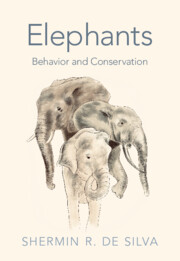7 - Communication and Cognition
Published online by Cambridge University Press: 12 December 2024
Summary
Communication and cognition are presented as deeply interrelated aspects of the mind, the means by which animals perceive, respond to, and understand each other as well as their world. This chapter reviews chemosensory, vibrational (acoustic and seismic), visual and tactile sense modalities, the various ways in which people have attempted to exploit these sensory channels to manage problematic behaviors, and the ways in which anthropogenic disturbances and pollutants can interfere with signaling. It then delves into domains such as self-awareness, personality, problem-solving, cooperation, social learning, and culture. The chapter considers intriguing adaptive hypotheses such as that of cognitive buffering, before provoking reflection on the downstream consequences of social disturbance and trauma. Drawing on experimental studies on elephants and a range of other species from honeybees to whales, the comparative perspective positions cognitive abilities within their broader ecological and evolutionary contexts, and highlights why it is crucial to account for phenomena such as social learning and culture in protecting and managing elephant populations.
Keywords
- Type
- Chapter
- Information
- ElephantsBehavior and Conservation, pp. 165 - 210Publisher: Cambridge University PressPrint publication year: 2024

